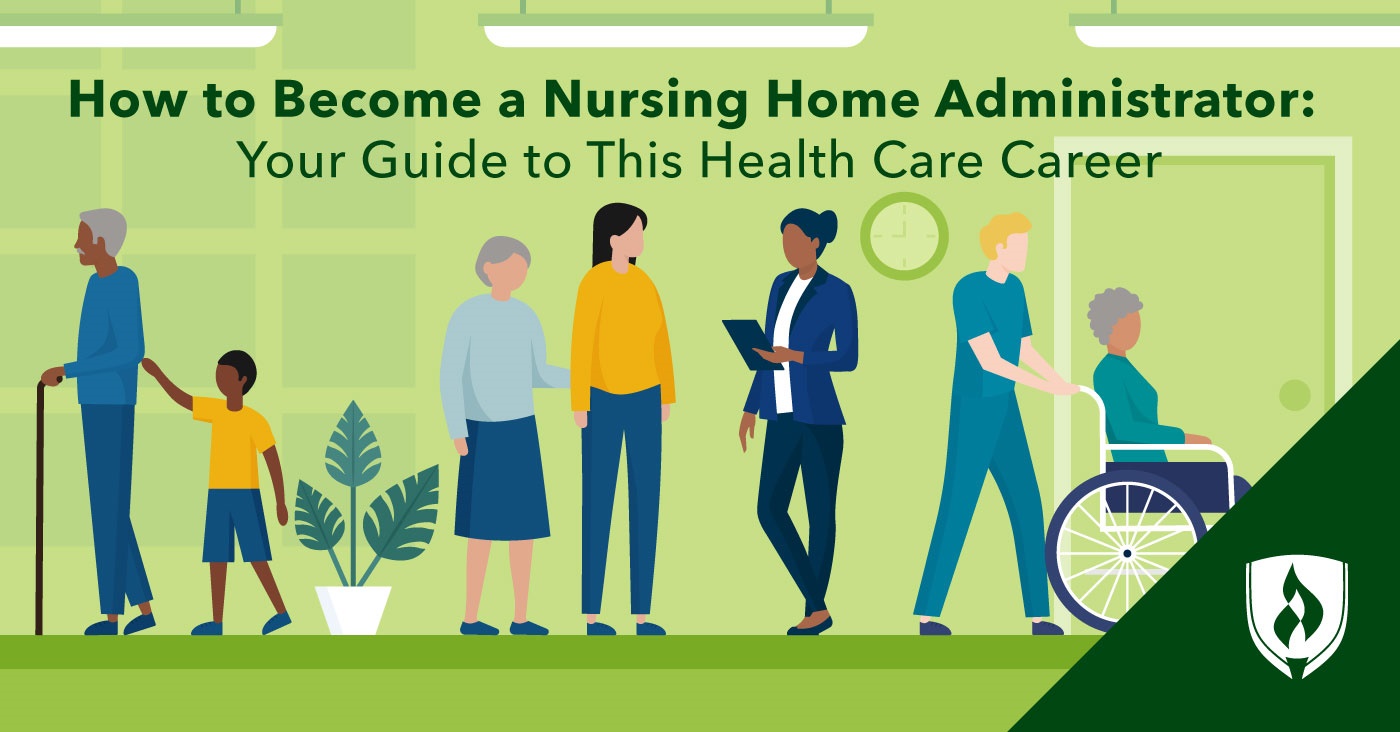How to Become a Nursing Home Administrator: Your Guide to This Health Care Career
By Carrie Mesrobian on 10/18/2021

Whether you’re interested in starting your career in the business side of healthcare or you’re an experienced healthcare professional looking to change focus, pursuing a career in nursing home administration can be an appealing next step.
Like with many roles in the healthcare field, there’s opportunity to be found in the coming years as the massive post-WWII baby boom generation continues to age into retirement. The Bureau of Labor Statistics (BLS) projects employment of medical and health services managers—a category that includes nursing home administrators—to grow by 32 percent from 2020 to 2030, and it's easy to understand how this field may have caught your eye.1
Of course, employment projections is just a small part of the picture. If you’re considering this career path, you’ll also want to know more about what the job typically entails and what you’ll need to do to become a nursing home administrator—and we can help with that. Read on to learn more about this growing healthcare role. Curious about what it' s like working in a nursing home? Read more in our other article here.
What do nursing home administrators do?
Nursing home administrators oversee the operations and staff at facilities for elderly patients who require around-the-clock care. In addition to providing quality healthcare to their residents, nursing home administrators are tasked with creating and maintaining budgets, hiring and training all staff and ensuring the building, as well as its professionals, are in compliance with all local, state and federal regulations.
This means everything from the food service to the mop buckets and the bedding to the medication carts fall under a nursing home administrator’s watch. Public relations and communications are also big parts of the job, which can be extremely complicated, as seen in the recent pandemic where COVID-19 safeguards had to be developed, implemented and explained to worried family and community members.
Some nursing home administrators work specifically with the families of residents in their care, advising them on treatments and procedures, while others coordinate directly with physicians and nurses to implement individual patient care plans. Still others focus on outreach and coordination of enrichment activities for residents, which can include recreational, spiritual, educational, physical and therapeutic types of programs.
Another hugely important piece of their work is managing the facility’s finances. Like any other privately owned business, these facilities need effective financial stewardship to cover expenses and ultimately turn a profit. That can be a challenge for relatively straightforward businesses—and nursing home facilities often depend on a complex mix of government funding via Medicare and Medicaid, third-party insurance provider payments.
A care community that’s always running
As nursing homes operate 24/7, this job can feature non-standard hours, including evenings, weekends and on-call shifts. Holidays are also a part of many nursing home administrators’ schedules, as these days are often when family and friends come to visit their loved ones who are residents, and may want to meet the administrators, as well.
Nursing homes require multi-tiered services for their residents. These facilities must be able to accommodate medical equipment and procedures, while also serving meals, dispensing medications, and cleaning and disinfecting common areas and patient rooms, while also offering a rotating schedule of programming. For example, a nursing home facility might have a yoga class, a dog therapy area, a bird-watching workshop, choir practice and a book club discussion all happening while nurses are making rounds, doctors are looking at charts and custodians are vacuuming carpets. As you might imagine, this takes excellent organization, planning and coordination skills to pull off well.
Long-term care facilities that provide medical care for resident patients have similar tasks, though these facilities may not be solely comprised of elderly people. Hospices and assisted living communities also require the basic skillsets that nursing home administrators need. The difference is in the focus of care coordination and kinds of programs and agencies they interact with in the community.
What does it take to become a nursing home administrator?
While it’s not necessarily a requirement, nursing home administrators often have previous experience in working with patients in a healthcare setting. Some are nurses looking for a new challenge, or social workers who have experience navigating healthcare systems. A desire to help people in their senior years is a big asset in this field, as is familiarity with health issues that affect the elderly, such as cognitive decline and memory care, heart disease, vision and hearing loss and end of life care.
At minimum, most nursing home administrators have a Bachelor’s degree and must meet the National Association of Long Term Care Administrator Board’s licensure requirements for their state. Because this job involves the business side of healthcare, some nursing home administrators choose to pursue a Master’s degree and specific training and experience in gerontology. Relevant coursework generally covers topics on aging, senior services, social policy and legal concerns for the elderly. Having an interest in helping those who are vulnerable in their later years is critical for this role, and one that communities everywhere rely upon daily.
Is a career in healthcare management in your future?
Healthcare management careers like that of a nursing home administrator offer an excellent opportunity to put your business acumen to use in a meaningful field. Well-run nursing home facilities help improve the quality of life for residents and can provide peace of mind to the families of residents.
If this path sounds like it could be the right fit for you, visit the Healthcare Management degree program page to learn how our flexible online programs could help you take that first step.
Still not sure if nursing home administration is the right fit for you? Learn more about some of your potential options with our article “What Can You Do With a Healthcare Management Degree? The Business Behind the Medicine.”
1Bureau of Labor Statistics, U.S. Department of Labor, Occupational Outlook Handbook, [career information accessed September 2021] www.bls.gov/ooh/. Employment conditions in your area may vary.




